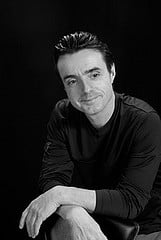In the Age of Always Connect, are we witnessing a plague of oversharing? If so, are social networks its vectors of transmission? Does this much-discussed phenomenon mark the Death of Shame, perhaps even a return to pre-modern notions of public and private? What does it mean to live in a historical moment when the faces in our high-school yearbooks materialize, without warning, in our Facebook lives, Walking Dead eager to rekindle friendships we thought we’d buried long ago? In his illustrated lecture, “(Face)Book of the Dead,” cultural critic and media theorist Mark Dery, author of seminal essays on online subcultures, culture jamming, and Afrofuturism, will address these and other questions, from the posthuman psychology of disembodied friendship to our growing unwillingness to untether ourselves from our social networks or the media drip, even for an instant. What does it say about us, as a society, if we’re unable to be alone and unplugged without being bored or lonely? Is this, at root, a fear of the emptiness in our heads? Should we preserve some small space in our lives for solitude—a Walden of the mind, away from the Matrix?
Mark Dery is a cultural critic. He is best known for his writings on the politics of popular culture in publications such as The New York Times Magazine, Cabinet, Bookforum, Rolling Stone, Elle, and Wired; on websites such as True/Slant and Thought Catalog; and in books such as The Pyrotechnic Insanitarium: American Culture on the Brink and Escape Velocity: Cyberculture at the End of the Century. Dery’s latest book is an anthology of his recent writings, I Must Not Think Bad Thoughts: Essays on American Empire, Digital Culture, Posthuman Porn, and Lady Gaga’s Lesbian Phallus, published in Brazil by Editora Sulina. Dery is widely associated with “culture jamming,” the guerrilla media criticism movement he popularized through his 1993 essay “Culture Jamming: Hacking, Slashing, and Sniping in the Empire of the Signs,” and “Afrofuturism,” a term he coined in his 1994 essay “Black to the Future” (included in the anthology Flame Wars: The Discourse of Cyberculture, which he edited). He has been a professor of journalism at New York University, a Chancellor’s Distinguished Fellow at UC Irvine, and a Visiting Scholar at the American Academy in Rome. He is at work on a biography of the artist Edward Gorey for Little, Brown.



